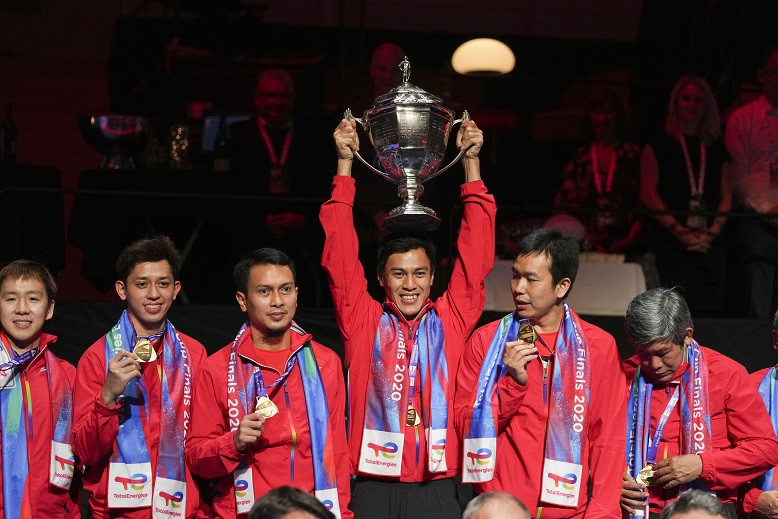Popular Reads
Top Results
Can't find what you're looking for?
View all search resultsPopular Reads
Top Results
Can't find what you're looking for?
View all search resultsThomas Cup blemish
The blame should be laid with the country’s sports authorities, including Sports and Youth Affairs Minister Zainuddin Amali and the National Antidoping Agency (LADI).
Change text size
Gift Premium Articles
to Anyone
I
ndonesia relished yet more badminton glory after winning the Thomas Cup men’s team title for a record 14th time, the first in 19 years on Sunday, but the celebration turned sour as the champion could not fly the national flag during the trophy presentation ceremony at Ceres Arena in Aarhus, Denmark. That is scandalous, or humiliating at best, because having the Red and White flag hoisted in an international competition is the dream and pride of all Indonesian athletes.
Indeed the incident in Aarhus is not the end of the sad story. Indonesian athletes will be banned from raising the Red and White flag in any international events they win, including the World Superbike race in Mandalika circuit in Lombok, West Nusa Tenggara, next month. Worse, Indonesia may be banned from hosting the prestigious MotoGP race next year, scheduled to be also held also at the Mandalika circuit.
It is ironic that amid the euphoria that rivaled the nationwide delight after the country’s top women’s doubles team won a gold medal in the Olympic Games in Tokyo in August, Indonesian sportsmen and women have to endure punishment for a mistake they did not commit.
The blame should be laid with the country’s sports authorities, including Sports and Youth Affairs Minister Zainuddin Amali and the National Antidoping Agency (LADI). Their failure to adhere to, if not ignorance of, the World Anti-Doping Agency’s (WADA) rules has put the international career of Indonesian athletes in jeopardy.
Early this month WADA declared Indonesia, Thailand and North Korea noncompliant for not implementing effective testing programs. As a result the three countries are ineligible to host regional, continental or world championships during their one-year suspension.
Compliance with WADA’s antidoping code matters as part of efforts to promote sportsmanship and integrity in sport. Last year WADA handed a four-year ban on Russia, but the Court of Arbitration for Sport later halved the punishment. Still the court ruling rendered Russia ineligible to compete in the Tokyo Olympics and next year’s Winter Olympics in Beijing.
In Indonesia’s case Zainuddin said the COVID-19 pandemic had prevented LADI from extracting enough samples from athletes and sending them to WADA. As of the second quarter of the year LADI managed only to collect 72 samples, and promised to send 300 more until WADA issued a warning on Sept. 15. It was not until after WADA announced its punitive action that Zainuddin said LADI would send 700 samples taken during the just concluded National Games in Papua.
While the pandemic has canceled many national, regional and international events, the health crisis could not justify this disregard for the WADA rules. The fact that almost every country, except Indonesia and two others, could make it shows the underlying issue is commitment.
Zainuddin has apologized for the Thomas Cup incident and entrusted National Olympic Committee (NOC) chairman Raja Sapta Oktohari with lobbying the International Olympic Committee and facilitating communication between LADI and WADA, with the purpose of easing Indonesia’s punishment. Okto is slated to visit the IOC headquarters in Lausanne, Switzerland, after attending the NOCs’ meeting in Greece this weekend.
Okto would have not had to go the extra miles, literally, if we had not taken the world’s antidoping drive lightly.










